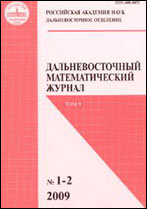|
|
Dal'nevostochnyi Matematicheskii Zhurnal, 2008, Volume 8, Number 2, Pages 229–234
(Mi dvmg51)
|
 |
|
|
Variations estimates
G. Sh. Tsitsiashvili
Institute of Applied Mathematics, Far-Eastern Branch of the Russian Academy of Sciences
Abstract:
A problem of an estimation of a random deviation between observations and a regression function is considered. This problem is originated from an analysis of time series of overground air dynamics. These observations attract large interest wiht a connection of global climate warming phenomenon. Calculations showed that an annual trend of a monthly average temperature in a fixed point takes place against fluctuations which are $10-100$ times bigger. These fluctuations are connected with different climate cataclysms. So a problem of an estimation of these fluctuations variations is actual now. A problem of a variation estimation is solved by an empirical variation. But even for this widely used statistics it is complicated to calculate its own variation. To calculate a variation of an estimate for a variation of a deviation from a polynomial regression function is much more difficult. Nevertheless it is possible to solve this problem if observations are made in integer-valued points. This problem is solved in two steps. At the first step an analog of empirical variation is constructed so that it is possible to calculate its own variation. At the second step for a regression function, represented as a polynomial of integer-valued argument, a special recurrent procedure is constructed. This procedure transforms random observations of the polynomial into a sequence of i.i.d.r.v`s. Then it is possible to use results of the first step. This algorithm is realized without an estimation of the regression function coefficients. All these constructions may be spread to a multidimensional case easily.
Key words:
variance, covariance, linear regression analysis.
Received: 17.04.2008
Citation:
G. Sh. Tsitsiashvili, “Variations estimates”, Dal'nevost. Mat. Zh., 8:2 (2008), 229–234
Linking options:
https://www.mathnet.ru/eng/dvmg51 https://www.mathnet.ru/eng/dvmg/v8/i2/p229
|

|




 Contact us:
Contact us: Terms of Use
Terms of Use
 Registration to the website
Registration to the website Logotypes
Logotypes







 Citation in format
Citation in format 